|
|
|
Sort Order |
|
|
|
Items / Page
|
|
|
|
|
|
|
| Srl | Item |
| 1 |
ID:
146451
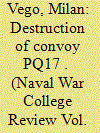

|
|
|
|
|
| Summary/Abstract |
The most critical problem for the Western Allies in the northern European theater in 1941–42 was the urgent need to secure the war matériel being sent to the Soviet Union. Initially, the Germans did not react strongly against the Allied convoys sailing to northern Russia.
|
|
|
|
|
|
|
|
|
|
|
|
|
|
|
|
| 2 |
ID:
130725


|
|
|
|
|
| Publication |
2014.
|
| Summary/Abstract |
The German government's 2011 abstention from the United Nations Security Council vote on military intervention in Libya raised questions about Germany's role in the international system. By abstaining, Germany broke with its Western allies and aligned itself with four of the BRICS countries: Brazil, Russia, India and China. Its 'non-Western' act unleashed a debate on the future of German foreign policy. This contribution aims to provide an understanding of Germany's new foreign policy. It characterises some basic political developments, outlines recent German academic debates about the character of German foreign policy and provides an interpretation of the government's New Players Concept ('Shaping Globalization - Expanding Partnerships - Sharing Responsibility'), which was adopted in 2012.
|
|
|
|
|
|
|
|
|
|
|
|
|
|
|
|
| 3 |
ID:
035861
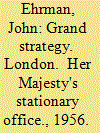

|
|
|
|
|
| Publication |
London, Her Majesty's Stationary Office., 1956.
|
| Description |
xvi,442p.
|
| Series |
History of the Second Worls War:United Kingdom Military Series
|
| Contents |
Vol. VI: October 1944- August 1945.
|
|
|
|
|
|
|
|
|
|
|
|
Copies: C:1/I:0,R:0,Q:0
Circulation
| Accession# | Call# | Current Location | Status | Policy | Location |
| 009219 | 940.54012/EHR 009219 | Main | On Shelf | General | |
|
|
|
|
| 4 |
ID:
086307
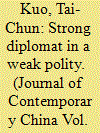

|
|
|
|
|
| Publication |
2009.
|
| Summary/Abstract |
Renowned as one of China's most eloquent and persuasive spokesmen in the United States during WWII, T. V. Soong, who served as Generalissimo Chiang Kai-shek's personal representative in Washington, had obtained vital US aid for China when it appeared that Chinese military will was about to collapse. He had negotiated strategic loans with the US and produced critical economic and military aid packages, thus projecting a strong national image of China to the Western Allies. But historians, until now, have known almost nothing about Soong's wartime, diplomatic endeavors, especially his managing of Sino-American relations. Archival materials at the Hoover Institution have only been recently opened, allowing this author to describe some unique episodes in US-China relations during the years 1940 to 1943.
|
|
|
|
|
|
|
|
|
|
|
|
|
|
|
|
| 5 |
ID:
126710
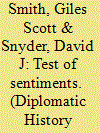

|
|
|
|
|
| Publication |
2013.
|
| Summary/Abstract |
For the best part of three decades, from 1946 until 1977, civil aviation played a central role in Dutch-American diplomatic relations, consistently causing major friction at the highest levels of both the government and the business sector on both sides of the Atlantic. Yet up till now this remarkable episode in the relations between two close transatlantic allies has remained under-researched and neglected by traditional diplomatic historians unable to grasp its full significance. The dispute centered on the ostensibly anodyne wish of the Dutch national airline, KLM, to expand its access to airports in the United States. Yet the "landing rights question" exposed more than ever the uneven power relations, clashing national interests, and antagonistic perceptions that lay behind the otherwise friendly relations between Washington and The Hague. The article examines the causes and consequences of these tensions through four intense periods of negotiations in the 1940s, 1950s, 1960s, and 1970s, each case involving a set of actors, interests, and strategies. On the U.S. side, the divergence between diplomatic and commercial interests lay at the heart of a hard-nosed civil aviation policy that was not prepared to give the Dutch what they wanted. Meanwhile for the Dutch, KLM represented the epitome of national pride and pioneering enterprise, and U.S. intransigence on the landing rights issue was regarded as hypocritical and a direct threat to the continuing vitality of the airline itself. Looking to overcome this asymmetric deficit, the Dutch employed various strategies-public diplomacy, the contacts of elite networks, the "rights" of a close ally-to secure results. Coming from the perspective of "New Diplomatic History," the article maintains that traditional state-centered historiography tends to miss the deeper terrain on which bilateral and multilateral relations among the western allies were conducted. As a result, it provides a behind-the-scenes view of alliance politics from a unique angle during the Cold War.
|
|
|
|
|
|
|
|
|
|
|
|
|
|
|
|
| 6 |
ID:
132548
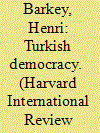

|
|
|
|
|
| Publication |
2014.
|
| Summary/Abstract |
Turkey's ruling Justice and Development Party (AKP), or in Turkish, Adalet ve Kalk?nma Partisi, came to power in late 2002 and went to win two more elections in 2007 and 2011, gaining a larger and larger share of the vote. No government since the 1950s had managed to achieve such a feat. A year ago, the AKP and Prime Minister Recep Tayyip Erdogan seemed poised to extend their dominance of Turkish politics for a decade or longer. A year later, however, in the aftermath of protests in early summer and a massive corruption scandal, uncertainty reigns. Erdogan and his party appear to have become unhinged. In fits of complete paranoia, they and their supporters have started to accuse everyone, especially Western allies and interests, for attempting to overthrow them.
Justice and Development Party - AKP
|
|
|
|
|
|
|
|
|
|
|
|
|
|
|
|
| 7 |
ID:
137310
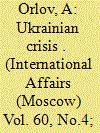

|
|
|
| 8 |
ID:
133621
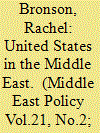

|
|
|
|
|
| Publication |
2014.
|
| Summary/Abstract |
Recent events in Ukraine have brought America's growing energy independence and its resulting geopolitical influence into sharp relief. Almost immediately after Moscow invaded Crimea, leaders on both sides of the Atlantic began urging Washington to strengthen its allies and weaken Russia's dominance by deepening its energy ties to Europe. In a letter sent to House Speaker John Boehner and Senate Majority Leader Harry Reid, the ambassadors from Poland, Hungry, the Czech Republic and Slovakia called on the United States to strengthen its "gas-to-gas competition" to enhance European energy security.1 President Obama echoed their call: "Energy is obviously a central focus of [American and European] efforts" vis-à-vis Russia.2 The United States has an opportunity to use its newfound energy assets to shape the political chessboard in ways unforeseen just a few years ago.
|
|
|
|
|
|
|
|
|
|
|
|
|
|
|
|
|
|
|
|
|